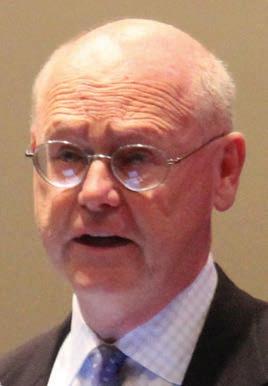RONALD FARRAR
“
People love my dad. And he loves them. Dad would not do well on a deserted island. There would be nobody to talk to. No stories to tell, and no people to interview — because that’s what Dad does. He interviews. — JANET WORTHINGTON
W
By Janet Worthington ill Norton, dean of the Meek School, asked me to tell you about my dad, Ronald T. Farrar, because he thought I did a great job with my mom’s eulogy. There’s a key difference here: Dad isn’t dead! Far from it! In fact, he just got back from Hawaii, where he acquired a righteous tan that has impressed his cardiologist and horrified his dermatologist. Before that, he was in Puerto Rico; before that, Scandinavia. My father is a newspaperman, a world-renowned expert on libel law, a graceful biographer, a heck of a teacher and, although he never really set out to be one, a miracle-working administrator. He started writing for the Log Cabin Democrat in Conway, Arkansas, while he was still in college at the University of Arkansas, and went on to work for the Arkansas Gazette, the Democrat in Trumann, Arkansas, and to contribute articles to newspapers around the country, including the Kansas City Star, Dallas Morning News, the Courier-Journal in Louisville, the Clarion-Ledger in Jackson, the Commercial Appeal in Memphis, and numerous professional journals. I was born when Dad was getting his doctorate in journalism from the University of Missouri in Columbia. His doctoral thesis became a book: Reluctant Servant: The Story of Charles G. Ross, about President Harry S Truman’s press secretary. That book, the first of eight Dad’s written so far, won the Kappa Tau Alpha Frank Luther Mott Research Award as the best scholarly book on journalism for 1969. Dad’s first faculty job was at Indiana University; my brother, Bradley, was born in Bloomington. In 1970 we moved to Dallas, Texas, where Dad was professor and chairman of the department of journalism at Southern Methodist University. He became professor and chairman of journalism at Ole Miss in 1973. His biggest goal was to get the department accredited, which he did. We moved to Lexington, Kentucky, in 1977, where Dad was professor and director of the school of journalism. At UK, Dad not only published more
12 MEEK SCHOOL
books, he took a cranky, divisive, tenured faculty and somehow made them work together. “Dad is like Red Adair,” says Bradley Farrar, a lawyer, lieutenant colonel in the Marine Corps Reserve and an excellent fiction writer. “He would come into a place, put out fires, inspire people, get things done, and always leave it better than he found it.” For years, Al Scroggins, dean of the college of journalism at the University of South Carolina, had been recruiting Dad to come join the faculty. In 1986, he did, becoming the Reynolds-Faunt Professor of Journalism, finally able just to teach and write. That didn’t last long. Scroggins retired, was succeeded by someone who also retired after a few years, who was succeeded by someone whose dismal people skills alienated most of the faculty. USC needed a leader, a peacemaker, someone who was not only actually liked, but beloved. They asked Dad to take over, and so Dad got back into administration, as interim dean of the college of journalism. He could have been the permanent dean, but he didn’t want to. While he was there, he did some amazing things, including partnering with a German group, Ifra, the world’s largest association of newspaper publishers, to build the Newsplex, a $2.5-million newsroom of the future, where journalists from all over the world have come for training. Dad raised tons of money for USC. He wrote a lot, too, including another acclaimed biography, A Creed for My Profession: Walter Williams: Journalist to the World, about the founder of the school of journalism at the University of Missouri. Bradley remembers coming to meet Dad for lunch one day and noticing a big case in the lobby with USC Journalism Faculty Publications. “There were basically 10 things in there,” he recalls, “and nine of them were Dad’s. He was always sought after, getting job offers even after he retired. He just instantly upped the productivity and prestige, wherever he went.” Dad retired in 2001, earlier than he probably intended to, because my mom got sick, and Dad felt like his more important job was to


















